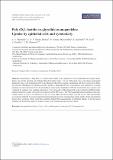Poly (D,L-lactide-co-glycolide) nanoparticles: Uptake by epithelial cells and cytotoxicity

View/
Date
2014Author
Nkabinde, L. A.
Shoba-Zikhali, L. N. N.
Semete-Makokotlela, B.
Kalombo, L.
Swai, Hulda
Grobler, A.
Hamman, J. H.
Metadata
Show full item recordAbstract
Nanoparticles as drug delivery systems offer benefits such as protection of the encapsulated drug against degradation, site-specific targeting and prolonged blood circulation times. The aim of this study was to investigate nanoparticle
uptake into Caco-2 cell monolayers, their co-localization within the lysosomal compartment and their cytotoxicity in different cell lines. Rhodamine-6G labelled poly(D,L-lactide-co-glycolide) (PLGA) nanoparticles were prepared by a double
emulsion solvent evaporation freeze-drying method. Uptake and co-localisation of PLGA nanoparticles in lysosomes were
visualized by confocal laser scanning microscopy. The cytotoxicity of the nanoparticles was evaluated on different mammalian cells lines by means of Trypan blue exclusion and the MTS assay. The PLGA nanoparticles accumulated in the intercellular spaces of Caco-2 cell monolayers, but were also taken up transcellularly into the Caco-2 cells and partially
co-localized within the lysosomal compartment indicating involvement of endocytosis during uptake. PLGA nanoparticles
did not show cytotoxic effects in all three cell lines. Intact PLGA nanoparticles are therefore capable of moving across
epithelial cell membranes partly by means of endocytosis without causing cytotoxic effects.
URI
https://doi.org/10.3144/expresspolymlett.2014.23https://dspace.nm-aist.ac.tz/handle/20.500.12479/890
